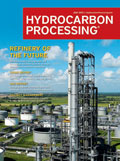
July 2015
Special Report: Refinery of the Future
The continued reduction in refined product sulfur specifications has revolutionized the industry’s landscape over the last decade, increasing the importance of hydrotreating solutions.
The increase in domestic production of light tight oil (LTO) has resulted in rapid shifts to processing these crudes in North American (NA) refineries.
Process automation in oil refineries is undergoing major changes, driven by customers frustrated by what they consider to be slow and incremental advances from the main automation OEMs in the industry.
This case study chronicles how the European refiner Rompetrol Rafinare SA upgraded its Petromidia refinery in Navodari, Romania, includingthe revamping the delayed coker unit (DCU) to address existing operating problems.
Bonus Report: LNG
Hydrocarbon Processing spoke to Andrew Slaughter, executive director for the Deloitte Center for Energy Solutions, about the state of the LNG industry and how trade patterns and project slates could change in the upcoming years.
Regional Report
China's energy demand, particularly for petroleum and other liquids, is rapidly increasing as its industrial and transportation infrastructures expand.
Gas Treating
Capacity and throughput improvement in a refinery LPG treating unit are made possible by implementing an amine recovery program.
Management
There are alternatives for implementing successful and sustainable staffing changes. Staffing changes for the purpose of improving profitability should be viewed as an optimization process rather than a reduction process.
Process Automation
Environmental regulations can add to the cost of doing business in the petrochemical industry, so making compliance more efficient and less expensive is a bottom-line priority.
Project Management
Management of project risk is a challenge under normal times, and this crucial activity is exasperated in complex projects as a result of the shale gas revolution.
Columns
Editorial commentary
Over the decades, there have been good and not-so-good trends presented at this event, and the 2015 maintenance and reliability conference was no exception.
Many automation and SIS vendors to the downstream HPI do not provide safety lifecycle management software that extends beyond initial commissioning work. In many cases, only the bare minimum SIF proof testing has been performed for the most critical protective and mitigative functions.
Hubs connect one piece of machinery to another, usually with some flexible coupling between them. Installers have only limited time to work with the hot hub. When incorrectly positioned, it may have to be removed, which has the potential of damaging the shaft end.
Egypt is adopting a mix of investment strategies in refinery upgrades and construction of new capacity to meet the nation’s target for more high-quality light and middle distillate products and a reduction of transportation fuel imports.
Raw materials costs continue to stay low in the US thanks to the shale boom, but the global decline in oil markets has eroded selling prices for many of the nation’s domestic chemicals and plastics producers.
Charles Drevna is a distinguished senior fellow of the Institue for Energy Research and the former president of AFPM. He was president of the trade association, formerly known as NPRA, from 2007 until May 2015.
Trends and Resources
Recent news events in the global HPI.
Up-to-dateata tables and figures illustrate the state of the worldwide HPI, including cracking spreads, margins and utilization rates.
What's new in HPI innovations
What's happening in the world of HPI executives.
Paper, publication, video and mobile library app support the spread of HPI information and technology.
New product developments in the hydrocarbon processing industry.

- INEOS receives €300-million grant to rejuvenate and decarbonize its Lavera plant 2/19
- AGC Vinythai commissions expanded chlor-alkali plant and e-BiTAC electrolyzers from thyssenkrupp nucera 2/19
- BASF launches AdBlue GE (green electricity) to decarbonize mobility value chain 2/19
- Carbon Neutral Fuels select Johnson Matthey, bp and Honeywell UOP technologies for UK SAF plant 2/19
- ExxonMobil starts operations on second carbon capture project in Louisiana (U.S.) 2/19
- Pall introduces two new technologies to reduce CAPEX and TCO in oil and gas processing 2/19




